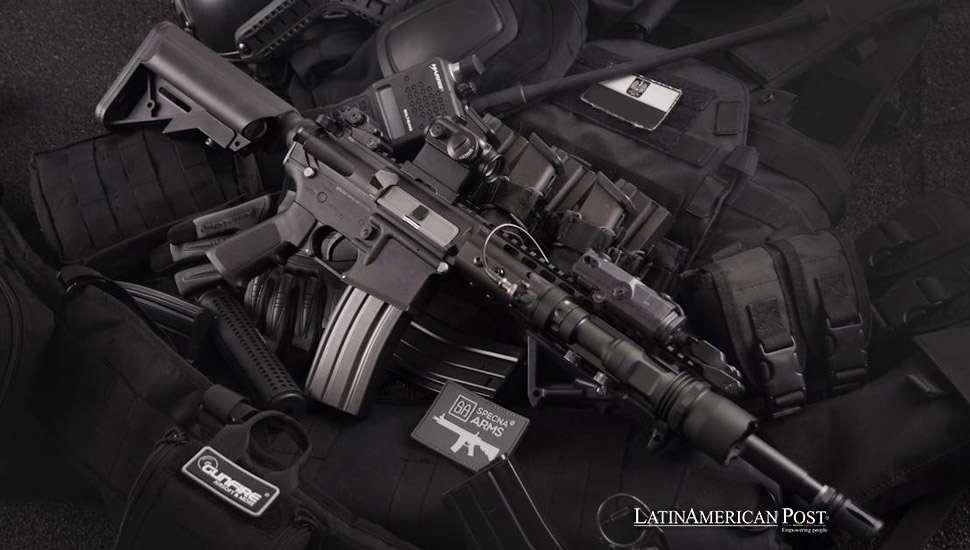Mexico’s $10 Billion Lawsuit Against U.S. Gun Manufacturers Faces Major Setback

A U.S. judge has dismissed most of Mexico’s $10 billion lawsuit against American gun manufacturers, accusing them of fueling rampant weapons trafficking across the border, a move that has significant implications for Mexico’s legal battle against the gun industry.
In a highly anticipated legal decision, a U.S. federal judge has thrown out the majority of a $10 billion lawsuit filed by the Mexican government against several major U.S. gun manufacturers. The lawsuit, initiated in 2021, sought to hold these companies accountable for the rampant trafficking of firearms into Mexico, which the government claims has fueled the country’s devastating levels of violence. According to Mexican authorities, an estimated 500,000 guns cross the border illegally each year, contributing to the power and lethality of the country’s violent drug cartels.
The lawsuit, filed in a federal court in Massachusetts, targeted eight prominent U.S. gun manufacturers, including Smith & Wesson Brands and Witmer Public Safety Group. Mexico’s central argument was that these companies’ business practices have knowingly contributed to the illegal flow of firearms into Mexico. The Mexican government asserted that the “flood” of illegal guns in the country is not an unintended consequence but rather a foreseeable outcome of the manufacturers’ deliberate actions.
Mexico’s restrictive gun laws make legal firearm purchases within its borders extremely difficult. There is only one gun shop in the entire country, located in a military complex in Mexico City, where prospective buyers must undergo extensive background checks that can take months to complete. These stringent regulations have led criminal organizations to source weapons from the United States, where firearms are more readily available. The lawsuit contended that U.S. gun manufacturers are aware of this dynamic and have done little to prevent their products from being trafficked into Mexico, thereby fueling the violence that has gripped the nation for years.
The Judge’s Ruling
However, in a significant blow to Mexico’s legal strategy, U.S. District Judge Dennis Saylor dismissed the claims against six of the eight companies in the lawsuit. Judge Saylor described Mexico’s allegations as “gossamer-thin at best,” concluding that the country failed to provide sufficient evidence to prove that the actions of the gun manufacturers directly caused harm to Mexico.
The ruling highlights the legal challenges that Mexico faces in trying to hold U.S. companies accountable for the violence within its borders. One of the critical hurdles is the difficulty in drawing a direct line between the sale of firearms in the United States and the violence perpetrated by criminal organizations in Mexico. Judge Saylor noted that Mexico did not adequately demonstrate that any guns sold in Massachusetts, where several of the companies are based, were directly linked to the harm experienced in Mexico.
The judge’s decision effectively narrows the lawsuit’s scope, leaving Smith & Wesson Brands and Witmer Public Safety Group as the remaining defendants. While the case is not entirely dismissed, Mexico must recalibrate its legal approach if it hopes to succeed in its claims against these two companies.
Mexico’s Response and Next Steps
In response to the ruling, Mexico’s foreign ministry issued a statement expressing disappointment but emphasizing that the legal battle is far from over. The ministry stated that the judge’s decision did not absolve the other six companies of responsibility. It confirmed that Mexico is considering its legal options, including filing an appeal or pursuing action in other U.S. federal courts.
“Mexico is exploring various options, including a possible appeal or resorting to other federal courts in the U.S.,” the statement read. The government is determined to continue its fight against what it perceives as a critical issue that has had devastating consequences for its citizens.
The Mexican government’s determination to hold U.S. gun manufacturers accountable is rooted in the staggering levels of violence that have plagued the country for years. According to official statistics, more than 30,000 people were murdered in Mexico in 2023 alone, many of these deaths attributed to firearms trafficked from the United States. Mexican authorities argue that the violence is exacerbated by the easy availability of guns in the U.S., which are then funneled into the hands of criminals across the border.
The Argument from U.S. Gun Manufacturers
From the perspective of the gun manufacturers, the lawsuit was flawed from the start. The companies have consistently argued that Mexico cannot establish a clear connection between their business practices and the violence occurring in the country. They contend that once firearms are legally sold in the United States, the manufacturers cannot control what happens to them after that, mainly if they are illegally trafficked into another country.
Furthermore, the companies have pointed to U.S. law as a protective shield against such lawsuits. The Protection of Lawful Commerce in Arms Act (PLCAA), enacted in 2005, provides gun manufacturers with broad immunity from lawsuits that seek to hold them liable for crimes committed with their products. This law has been a significant obstacle for Mexico’s case, as it limits the circumstances under which gun manufacturers can be sued for the misuse of their products.
The companies have also challenged the notion that they should be held responsible for the actions of “straw buyers”—individuals who legally purchase firearms in the U.S. only to pass them on to criminals. These buyers often circumvent background checks and other legal safeguards, making it difficult for manufacturers to detect and prevent such transactions. Gun manufacturers argue that they have no legal obligation to monitor the end-use of their products beyond what is required by U.S. law.
Implications for International Relations and Gun Control
The dismissal of most of Mexico’s lawsuit has broader implications for international relations and the ongoing debate over gun control. The case highlights the complexities of addressing cross-border issues, particularly concerning the regulation of firearms, a deeply contentious issue in the United States.
For Mexico, the lawsuit was not just about seeking financial compensation but also about drawing international attention to the role that U.S. gun manufacturers play in the violence that has ravaged the country. By pursuing this legal action, Mexico aimed to pressure the U.S. government and the gun industry to take more responsibility for the weapons that end up in the hands of criminals south of the border.
The case’s outcome may also influence future efforts by other countries to hold U.S. companies accountable for activities that have harmful effects beyond U.S. borders. If Mexico fails to secure a favorable ruling, it could discourage similar lawsuits and reinforce the legal protections that U.S. companies currently enjoy.
On the other hand, the case could also galvanize efforts to reform U.S. gun laws, particularly those related to the international trafficking of firearms. Advocates for stricter gun control argue that the U.S. has a responsibility to prevent its firearms from fueling violence in other countries and that current laws do not go far enough in addressing this issue. The lawsuit has brought renewed attention to the PLCAA and its implications for holding gun manufacturers accountable, potentially setting the stage for future legal and legislative battles.
As Mexico considers its next steps, the legal and political landscape surrounding gun control and international accountability continues to evolve. The case underscores the interconnectedness of global issues, where actions and policies in one country can profoundly affect another. For Mexico, the fight against the illegal trafficking of firearms is not just a legal battle but a critical part of its broader efforts to curb violence and restore peace to its communities.
The remaining claims against Smith & Wesson Brands and Witmer Public Safety Group will proceed, providing Mexico with another opportunity to make its case. However, the challenges are formidable, and the outcome remains uncertain. Whether through the courts or through diplomatic channels, Mexico’s pursuit of justice in this matter is likely to continue, as the stakes are too high to ignore.
Also read: U.S. Agents Battle Hidden Drug Mexico-China Network
In the meantime, the case serves as a reminder of the complex and often contentious relationship between the United States and Mexico, particularly when it comes to issues of security and sovereignty. As both countries navigate this latest chapter in their ongoing struggle against violence and crime, the implications of this legal battle will be felt on both sides of the border for years to come.





